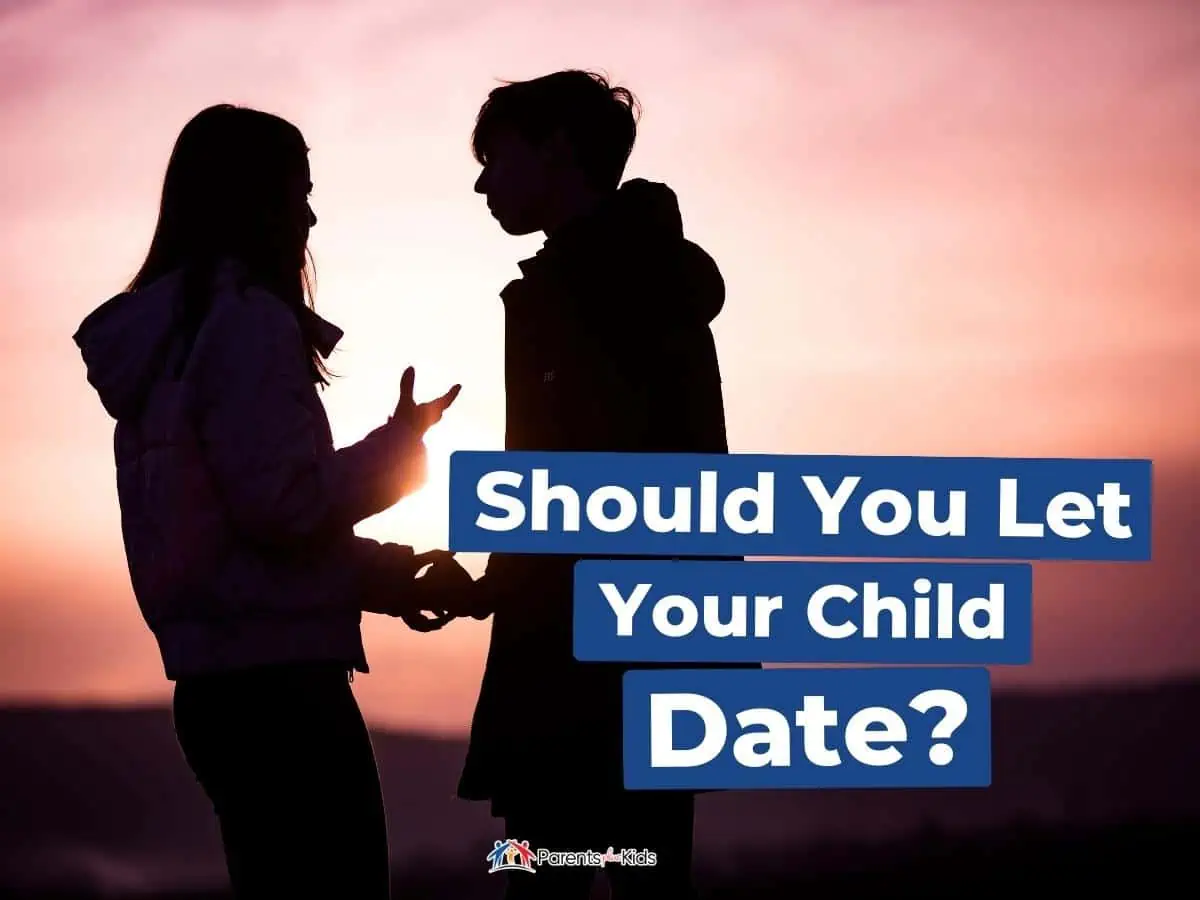Should You Let Your Child Date?

This post may contain affiliate links. If you buy through the link, I may earn a commission. Learn More.
Dating is a tricky subject. We all want our children to be happy and to have companionship.
What we don’t want is for them to experience all of the heartbreak and even physical danger that sometimes comes with the dating world.
What is a well-meaning parent to do?
Should My Child Be Allowed to Date?
Yes, your child should be allowed to date. You should also have strict rules about dating. You need to know the person your child is dating, where they will be, and have a solid curfew in place. You also need to talk to your child about all of the issues that accompany relationships.
What is it Like For Kids to Date in the 21st Century?
Most of the parents wondering whether or not their children should be dating probably have little experience with dating in the 21st century.
The dating world has changed even in the last 10 years.
Many people, even teens, connect online. They spend a great deal of time chatting in the virtual world before they even date.
A peril that comes with 21st-century dating is ensuring that your child actually knows who they are talking to. There have been instances of abductions when a child is groomed by a predator.
Because this is a very real possibility, it is necessary that your child only chats with people they have already met in person.
It’s not always possible to police your child’s online presence, but there are measures that you can put in place.
For instance, my children are only allowed to use screens in public areas of the home. No iPads, laptops, or phones are allowed in bedrooms.
I have also followed social media guidelines by not allowing my children to have social accounts until the age of 13.
Lastly, it’s very important to talk to children about the prevalence of online predators.
What Age is the Right Age for Dating?

When I was growing up, the rule was that I could start dating at age 15 and could go on car dates (that is, dates in which one of the kids is driving rather than parents dropping us off) at age 16.
I went on my first date at age 13 because, to me, the household rules were neither interesting nor applicable.
The rest of my friends were dating at 13, therefore I felt like I should be as well. My parents didn’t need to know.
I’ve done my best to learn from my young, rebellious self when establishing rules for my children.
Is there a right or wrong age for a child to start dating? Is it the age that the rest of their friends seem to be dating? Does it depend on the child’s age?
Experts say that a child should not go on a single date before age 16. The argument is that they can go on group dates before that age, but prior to 16, they may not have the skills to get themselves out of difficult situations.
Group dates may start as early as 13 or 14. These are situations in which teens may be partnered up romantically but still have other friends attending the event with them.
Taking an approach such as this gives your child the opportunity to explore the dating world while remaining safe.
What Restrictions to Place on Your Kid Dating?
There are some standard restrictions that should apply when allowing your child to go on a date.
Ask these questions of yourself and your teenager to determine the rules you want to enact in your house.
1. Who is My Child Dating?
You might not know the person your teen is currently smitten with, but you should. Before your teen goes on a single, one-on-one date with this person, you need to get as much information as possible.
It can be as little as knowing the person’s name, the name of their parent(s), where they live, and how they met your teen.
You might go as far as insisting you physically meet the date before your child is allowed to go out. I like to find a middle ground.
I ask as many questions as I can, including what their grades are like, who are their friends, do they work and what are their extracurricular activities.
I then look for their online presence. At that point, I trust my child to make the right decision.
2. Where is the Date Taking Place?
It is absolutely necessary to know the exact location of the date. If your child will be going to multiple places, get those details as well.
My children have tracking apps on their phones that I can access, but I prefer direct contact.
My son texts me when he arrives to a location (i.e., a cineplex), texts again if he is leaving to go to a second location (restaurant), and texts when he is leaving to take his date home.
I never have to wonder where he is, and if something should happen, I can easily reach him.
Should he not get in touch, I could go one step further and use the tracking app. I’ve never had to do this, but it’s nice to have the option as a backup.
3. What is My Child’s Curfew?
The average curfew in the United States is about 9 PM to 10 PM on weeknights and 11 PM to 12 AM on weekends. You can use these rough guidelines when establishing curfews or come up with your own.
You may want to make them earlier if your child has early morning commitments.
My children have flexible curfews based on activities. If the activity is school sanctioned, like a dance or school-related party, they can have a later curfew.
The primary rule is that they need to stay in touch if the activity goes later than planned. The curfew is much stricter on non-school activities.
They have to be home by the curfew with no exceptions and no excuses.
They also need to text us before they leave so we can be certain there is no speeding happening in order to get home safely.
Having “The Talk” with Your Child
Dating doesn’t always equal sex, but that doesn’t mean you don’t need to have the talk.
Your kids will cover their ears, scream, yell, say “I already know this, please stop!” and generally make it far more uncomfortable than it already is. That doesn’t matter.
Kids need to learn these valuable lessons.
You can’t guarantee that they will get all of the knowledge they need from their sex education classes or from that guy Mickey who always sits at the back of the school bus.
How detailed should you get? As detailed as you can. Explain sex, sexually transmitted infections, and the ways to avoid pregnancy. It is not good enough to tell a teen not to have sex.
Whether you like it or not, the odds of your child remaining abstinent are not in your favor. In recent surveys, it has been found that more than half of teens between 15 and 19 have had some form of sexual experience.
Almost 40 percent of teens have had sexual intercourse by age 17. That figure jumps to 70 percent by 19. Do you think your child is the exception?
That’s fine, but it is still necessary to explain birth control. Part of that conversation should include some old wives’ tales.
Yes, you can still get pregnant when he “pulls out.” No, jumping up and down won’t prevent pregnancy.
You should also talk about when it’s okay to say no and when it’s okay to pressure a partner into doing more than they want. The answer to those two questions are always and never.
I have explained to my kids that it is always okay to say no at any point and for any reason. I have also explained that it is always wrong to pressure someone to do something they don’t want to do.
My son, who is the only child I have who is old enough to date, has been reminded almost too frequently that respecting his date is his number one job while he is out.
Should There Be Dating Requirement Differences Between Boys vs Girls?
Should you treat boys and girls differently when it comes to dating? At the risk of sounding sexist, I will say yes.
Girls are 18 times more likely to be date raped than boys. All teens need to be made aware of danger signs and how to get out of that situation.
Girls should carry a rape whistle or other form of self-defense even if they are certain they would never need it.
Key Takeaways
Let your child date but insist they make smart choices. Date in highly populated areas, respect each other, and be home at a reasonable time.
When did you start dating? When will you let your child start dating? Tell us in the comments!
